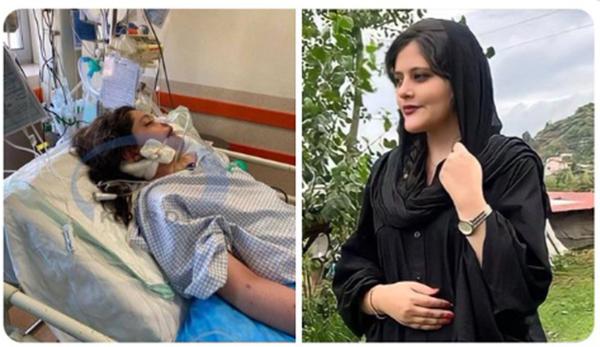
Mahsa Amini, 22, died from brutality and torture in the custody of Iran's "morality police."
As we write, there is an outpouring of ferocious anger and grief in the streets of Iran following the death of Mahsa Amini, a 22-year-old woman from Iran’s oppressed Kurdish region. Last week, she was visiting family in Tehran when she was viciously assaulted and arrested by Iran’s Islamic morality police thugs for violating hijab rules that mandate a woman’s hair be completely covered by a scarf and that she wear loose, not form-fitting clothing. A savage blow to her head put her in a coma and into an intensive care unit where she was pronounced braindead and died 3 days later on September 16.
Protests broke out immediately in front of the hospital as photos of her youthful smile appeared next to images of her battered body attached to a ventilator in a hospital bed spread on social media like wildfire. From Iran’s capital Tehran to the Kurdish city of Saqqez, angry chants rang out of “death to the oppressor” and “death to the [supreme leader Ali] Khamenei” with protesters throwing rocks at banners of his image. There were also rocks tossed at the police who fired live rounds and tear gas at protesters and those attending Mahsa’s funeral. Crowds of men and women stayed in the streets, some lasting all day until midnight. The angry response inside and outside Iran shook Iranian authorities to promise an official investigation (i.e., a cover up).
“Mahsa Amini is one among countless victims of the Islamic Republic’s war on women…. The government is responsible for her death and decades of women being harassed, detained and otherwise harmed under the guise of this discriminatory, inhuman law” said Hadi Ghaemi, Executive Director of the Brooklyn-based Center for Human Rights in Iran.
The resistance to this forced hijab rule and the theocratic Islamic Republic’s war on women has resulted in scores and scores of women being arrested then tormented and tortured as political prisoners in the dungeons of Iran’s theocracy established in 1979. (See “Iran’s Women Imprisoned and Tortured for Resisting Forced Hijab—Free Them Now!,” August 15, 2022.)
Included in this flesh-eating and soul-crushing war on women are escalated attacks on LGBT people. This includes the horrific death sentence recently given to LGBT activists and lesbians Zahra Sediqi and Elham Chubdar.
The poem below, by the prominent Kurdish poet and a secretary of the Iranian Writers Association Seyed Ali Salehi, is written to mourn Mahsa but expresses so much more about Iran as we fight to free all its political prisoners, and stand with the heroic resisters in and outside its prison walls.
Join us to protest Iran's murdering president Ebrahim Raisi when he addresses the UN on September 21 in New York City! (8:00 am, 47th Street and 2nd Avenue, Manhattan, NYC).
International Emergency Campaign: 562-507-1034
FreeIransPoliticalPrisonersNow.org / @IranPrisonEmerg
Mourning the Death of Mahsa Amini
by Seyed Ali Salehi (unofficial translation by IEC volunteers):
Oh my dear, my dear
I will cut off my braids to mourn you!
We have crawled down to the shadows,
thrown down our shields
and grown old.
On this endless abyss
One by one
We have fallen
into the hell of anxiety!
The pain
No, it’s beyond pain
This world, with no mercy
has blinded our eyes.
And we
One by one
have fallen to our death
into the terrifying depths of our fear!
I will show you the document of this repression:
smell it...
the poisonous rains of this land!
The world
smells like the burning braids of Sepideh and Mahsa...!
No, not even the pure seven waters of Zamzam*
could wash up the filthy hands of this monster!
From now on, wherever you see a girl's grave,
Bury me too, right there
It is time to give our condolences
to the living of this land.*The Seven Cleansing water of Zamzam is believed to wash away any crime or guilt.
